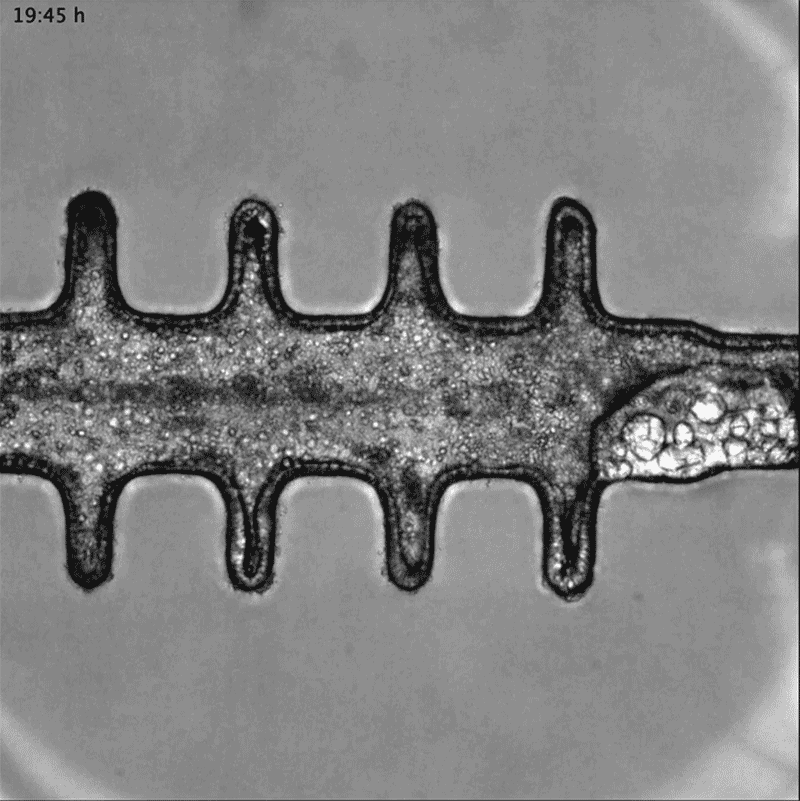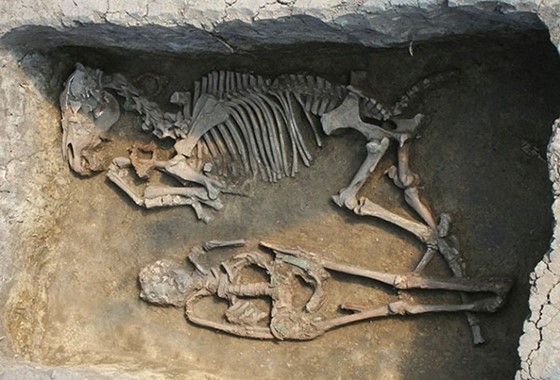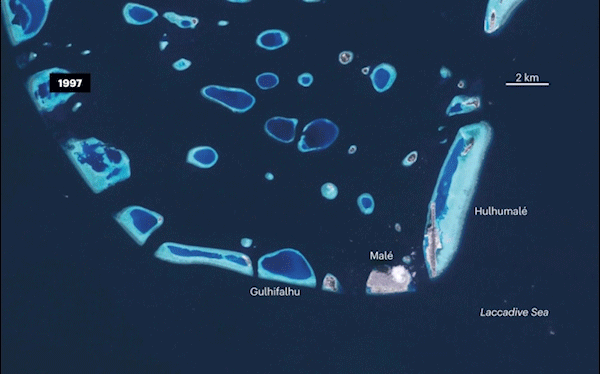Hello Nature readers, would you like to get this Briefing in your inbox free every day? Sign up here.

Researchers grew tumours inside a model of gut tissue created using mouse stem cells.Credit: Matthias P. Lutolf et al/Nature
Organoids offer models of disease
“In the last ten years, people spent a lot of time to develop and understand how to make organoids,” says chemical biologist Shuibing Chen. “But this is the time now to think more about how to use” them. Two teams have created ‘organoid’ models of the brain and gut to do just that. Researchers grew mouse stem cells on a scaffold to create a 3D model of the gut and then triggered tumour growth to mimic colorectal cancer. Another study created a brain organoid using human stem cells to mimic neurons involved in a rare genetic disorder, for which there is no good animal model. The organoid allowed researchers to test a novel therapy for the disease.
References: Nature paper 1 & paper 2
A sturdy atomic clock based on iodine
Engineers have created a compact but accurate atomic clock that weighs only 26 kilograms and is 1,000 times more precise than similar portable devices. The clock was tested on a three-week voyage aboard a New Zealand Navy ship around the Hawaiian Islands and kept time to within 300-trillionths of a second over a day. The best ‘optical’ clocks are based on atoms, such as strontium, that emit radiation at visible frequencies — but they are the size of dining tables and operate best under lab conditions. This new optical clock uses iodine molecules and could improve field measurements, such as mapping Earth’s gravitational field.
NATO’s expanding role in science
As the political and military alliance NATO expands, its science interests are changing. Aside from defence projects, new priorities include studying how climate change and AI will affect defence and security; protecting underwater infrastructure; and what NATO calls ‘hybrid threats’, such as interference in elections and disinformation. But the role of science in building diplomatic bridges between NATO nations and Russia has been on ice since Russia’s invasion of Crimea in 2014.
Medieval graves reveal secrets of the Avars
DNA has been extracted from ancient graves in four cemeteries in Hungary that were once at the heart of a mysterious nomadic culture. “These people basically didn’t have a voice in history, and we are kind of looking into them this way — through their bodies,” says archaeogeneticist Zuzana Hofmanová. The Avars were nomadic people who migrated to eastern and central Europe from the late sixth century to the early ninth century. The researchers analyzed genomes from 424 individuals using computational techniques to connect distant family members through their shared DNA, including a nine-generation family tree. The data suggest that the Avars kept aspects of their cultural heritage from the Asian steppes, such as very strict rules against inbreeding.
Get the expert view from geneticist Lara Cassidy in the related Nature News & Views article (7 min read, Nature paywall)

A late Avar-period male grave also containing a horse and horse harness. Credit: Sándor Hegedűs
Features & opinion

How saving the Maldives might destroy it
In a desperate attempt to keep its nation above rising seas and its economy thriving, the government of The Maldives — a group of islands where 80% of land is less than 1 metre above sea level — has started to hoover up sand, coral, and debris from the ocean floor and use it to form new land. But the controversial project could put at risk coral reefs and seagrass meadows. “Atolls are extremely vulnerable ecosystems,” says water-management specialist Bregje van Wesenbeeck. “Once you start to interfere with them, you’re sort of failing them.”
Nature | 14 min read and video (5 minute watch)
How volcanoes shape our planet
“Adventures in Volcanoland reminds us that we should all keep careful watch on the world’s volcanoes,” writes reviewer and volcanologist Heather Handley. She enjoys an ‘enchanting’ tour of the world’s more notorious and active volcanoes offered by volcanologist Tamsin Mather in her wide-ranging and absorbing book. Understanding volcanoes requires dedication and a degree of risk-taking. The effort is worth it, Mather explains, to help volcanologists answer big questions about how eruptions have affected life on Earth, and how to plan and prepare for the next big eruption.
The unlikely friendship of Pauli and Jung
“It was as if the wind had blown in from the lunatic asylum,” wrote psychoanalyst Carl Jung, of physicist Wolfgang Pauli’s first visit. Scientist and writer Arthur I. Miller tells the tale of how the patient-analyst relationship between Jung and Pauli evolved into a friendship that deeply influenced Pauli’s work. “Pauli had always been fascinated by alchemy, magic and myth, all of which were central to Jung’s psychology,” writes Miller. “Privately, he attributed his work towards CPT [charge, parity, and time] symmetry to discussions and creativity sparked through his conversations with Jung.”
